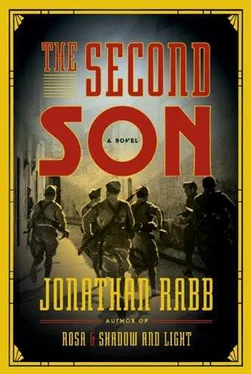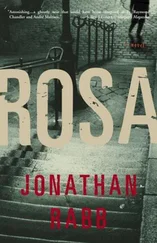Jonathan Rabb - The Second Son
Здесь есть возможность читать онлайн «Jonathan Rabb - The Second Son» весь текст электронной книги совершенно бесплатно (целиком полную версию без сокращений). В некоторых случаях можно слушать аудио, скачать через торрент в формате fb2 и присутствует краткое содержание. Жанр: Политический детектив, на английском языке. Описание произведения, (предисловие) а так же отзывы посетителей доступны на портале библиотеки ЛибКат.
- Название:The Second Son
- Автор:
- Жанр:
- Год:неизвестен
- ISBN:нет данных
- Рейтинг книги:4 / 5. Голосов: 1
-
Избранное:Добавить в избранное
- Отзывы:
-
Ваша оценка:
- 80
- 1
- 2
- 3
- 4
- 5
The Second Son: краткое содержание, описание и аннотация
Предлагаем к чтению аннотацию, описание, краткое содержание или предисловие (зависит от того, что написал сам автор книги «The Second Son»). Если вы не нашли необходимую информацию о книге — напишите в комментариях, мы постараемся отыскать её.
The Second Son — читать онлайн бесплатно полную книгу (весь текст) целиком
Ниже представлен текст книги, разбитый по страницам. Система сохранения места последней прочитанной страницы, позволяет с удобством читать онлайн бесплатно книгу «The Second Son», без необходимости каждый раз заново искать на чём Вы остановились. Поставьте закладку, и сможете в любой момент перейти на страницу, на которой закончили чтение.
Интервал:
Закладка:
Hoffner hadn’t mentioned a rank; still, it was nice to hear he had merited a promotion.
“Take five men,” the sergeant continued, “rifles, a spool of wire, and find someone who knows what he’s doing with the lines.” He looked back at Hoffner and said quietly, “They like to think it’s coming from someone with clout. You know-a little pull.” Hoffner understood why the SS would have no trouble fitting in here. The man said, “You’ll want Alfassi. He’ll be having something to eat down in the Plaza del Torico. Ferrer’s. Straight on. You can’t miss it.”
Maybe it was the heat or the height or the horror of what lay just beyond the walls, but fascist Teruel was showing a good deal more spirit than had Zaragoza. The square was cluttered with people and animals; stands were filled with fruit and foods, some of which Hoffner had never seen-large gourds, and thin stalks with a kind of yellow flower sprouting along the sides. He imagined they were all edible, but why shatter the mystery? Planted in the middle was a small fountain and column, with a bronze bull standing atop it. A few children were howling up at the bull, while a young priest, dressed in full cassock, sat on the edge of the fountain and rinsed his eyeglasses under one of the spouts. Without warning, the priest howled back, and the children darted off. Laughing, the priest shouted after them and a woman crossed herself as she walked past. The priest nodded piously and began to wipe his glasses on his sleeve. Murderers at the gate, and this was all the comfort Teruel required.
Hoffner had parked the car on one of the side streets. He and Mila were now walking toward a narrow building on the far side of the fountain. As with everything in this part of the world, it was an odd mixture of styles, thin alabaster columns along the second floor facade, and a pink Mudejar tower peeking out at the top left. As the floors climbed, the windows moved from simple rectangles to arches to half-moons, with the usual ironwork balconies stretching out below them. It was the perfect place to meet a Spaniard called Alfassi.
Hoffner opened the door and Mila led them inside. The thick stone walls resembled a fortress grotto, damp and cool, although here there were hanging bulbs and tables and chairs, and a wooden bar that ran the length of the wall. Animal parts hung from metal hooks above, with two large pig heads the centerpieces of an otherwise ragtag display. As in the square, Hoffner was hard-pressed to define what most of this was-a few legs of something that seemed caught between a cow’s and a goat’s-but the conversation was light, the smells surprisingly good, and the presence of the Guardia almost nil. There was only one, sitting across from a gray-haired woman, his tricorn hat propped on the table between them. She was dressed all in black and, except for the face and hands, showed only two slivers of skin on each of the wrists. From the expression on the man’s face, she seemed to be in the midst of a nice harangue. Even with the rifle leaning against the table, he looked utterly helpless.
Hoffner followed Mila through. There were the expected stares, none more than a few seconds, before they arrived at the table. The woman was instantly silent, and the man looked up. Not wanting to offend, and not sure how the Guardia divvied up their ranks, Hoffner stole a page from the sergeant at the gate.
“Colonel Alfassi?” he said.
The man continued to stare. Hoffner thought he might have overreached-did the Guardia even have colonels? — when a voice a few tables back said, “Did you say Alfassi, Senor?”
Hoffner turned and saw a small spectacled face, tan summer suit, gold cuff links, and a thin red tie sitting over a bowl of soup. The man was perfectly bald, save for the neatly cropped strip of hair just above the ears. After a week of anarchists and soldiers, Hoffner found it almost jarring to see a man of wealth, especially in these surroundings. No surprise, then, that he was sitting alone. He held a newspaper which, from the look of the weathered edges, was at best a week old.
Hoffner said, “Yes, Senor,” and the woman went back to her harangue.
Hoffner and Mila stepped over, and the man introduced himself as Rolando Alfassi, a timber merchant whose time was now spent as chief member of the recently established Committee of Three for Public Honor. It was why the sergeant had sent them to him. Hoffner suspected that the honor in question might have more to do with the purging of Teruel’s remaining leftists, but why argue semantics with a man who had just ordered them a plate of jamon and two more glasses of lemon water? The pulp was thick enough to chew when the glasses arrived.
“From Zaragoza?” Alfassi said, as he cut slowly through a thin slice of the ham. He ate with great precision. “You know, we lost all telephone contact with Zaragoza last night.” He sniffed at the meat and ate it.
“Yes,” said Hoffner. “The sergeant at the gate mentioned it once or twice.”
Alfassi smiled. It was a simple straightforward smile. “And you’ve heard nothing about the south?”
The telephones were clearly not a concern for Alfassi. He was reading a week-old newspaper: Whatever information was meant to find him would find him.
“No, Senor,” said Hoffner. “We’ve been only in the north.”
Alfassi nodded as he worked through a second piece of the ham. “Then you’ve seen the atrocities, the nuns and the desecration. They say it was terrible before the soldiers stepped in.” He ate.
It was an odd place to begin a conversation: the quality of the road, the weather, the number of burned carcasses strewn across the church steps. Hoffner could have told Alfassi that, only yesterday, he had refused a tour of Zaragoza’s bodies still awaiting burial-the slaughtered workers with their union cards pinned to their shirts-but that might not have gotten Hoffner a second plate of the ham, which was really quite delicious.
“No,” said Hoffner. “I was traveling with the senora.”
“Of course.” Alfassi seemed genuinely remorseful. “Forgive me, Senora.”
Mila said blankly, “Have you buried your own?”
Alfassi stared for a moment, and it was only then that Hoffner realized Zaragoza had been very different for her. She had thought only of her brother: the truth of the war had been set aside for an afternoon. Here, she had no such luxury. He was inclined to remind her of the washing she had promised to do, but instead he said, “The senora is a doctor. She’s been attending to the wounded. She worries about disease.”
“A doctor finds all killing horrific,” said Alfassi. It was surprising to hear the compassion in his voice. “It must be difficult.”
“Yes,” she said, “it is.”
Alfassi leaned in and said quietly, “I find it all quite horrible myself.” It was as if he knew he wasn’t meant to admit it. “We have many, many bodies. Soon we’ll have more. It’s a terrible time.” He sat back and took another piece of the ham on his fork. “It’s never really a question of knowing God’s will, is it? But at least He’s there. To say He isn’t, or never has been, or shouldn’t be-” He slipped the fork into his mouth and shook his head. “Some choose to act impetuously, I know-every war has its excesses-but surely God has a right to protect Himself. What is Spain without God? What is God without Spain?” Alfassi swallowed and said, “Have they buried the bodies in Zaragoza?”
To call wholesale murder impetuous was unforgivable. Even so, it was clear that Alfassi’s fight was not about control or power. It was about fear-the simple fear of losing his God. And, as with all men who live through fear, he was looking for guidance. Holy vengeance was something new, at least in this century. Cleaning up after it was still open to debate.
Читать дальшеИнтервал:
Закладка:
Похожие книги на «The Second Son»
Представляем Вашему вниманию похожие книги на «The Second Son» списком для выбора. Мы отобрали схожую по названию и смыслу литературу в надежде предоставить читателям больше вариантов отыскать новые, интересные, ещё непрочитанные произведения.
Обсуждение, отзывы о книге «The Second Son» и просто собственные мнения читателей. Оставьте ваши комментарии, напишите, что Вы думаете о произведении, его смысле или главных героях. Укажите что конкретно понравилось, а что нет, и почему Вы так считаете.












